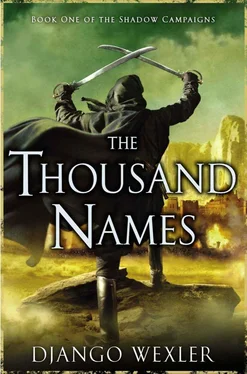Django Wexler - The Thousand Names
Здесь есть возможность читать онлайн «Django Wexler - The Thousand Names» весь текст электронной книги совершенно бесплатно (целиком полную версию без сокращений). В некоторых случаях можно слушать аудио, скачать через торрент в формате fb2 и присутствует краткое содержание. Жанр: Фэнтези, на английском языке. Описание произведения, (предисловие) а так же отзывы посетителей доступны на портале библиотеки ЛибКат.
- Название:The Thousand Names
- Автор:
- Жанр:
- Год:неизвестен
- ISBN:нет данных
- Рейтинг книги:4 / 5. Голосов: 1
-
Избранное:Добавить в избранное
- Отзывы:
-
Ваша оценка:
- 80
- 1
- 2
- 3
- 4
- 5
The Thousand Names: краткое содержание, описание и аннотация
Предлагаем к чтению аннотацию, описание, краткое содержание или предисловие (зависит от того, что написал сам автор книги «The Thousand Names»). Если вы не нашли необходимую информацию о книге — напишите в комментариях, мы постараемся отыскать её.
The Thousand Names — читать онлайн бесплатно полную книгу (весь текст) целиком
Ниже представлен текст книги, разбитый по страницам. Система сохранения места последней прочитанной страницы, позволяет с удобством читать онлайн бесплатно книгу «The Thousand Names», без необходимости каждый раз заново искать на чём Вы остановились. Поставьте закладку, и сможете в любой момент перейти на страницу, на которой закончили чтение.
Интервал:
Закладка:
“Get down to Lieutenant Goldsworth.” That was Val’s second-in-command, now in charge of the forces along the waterfront. “Tell him he’s to grin and bear it until they reach musket range, then give them a volley and fall back . I’ll be waiting for him with the First, and we’ll drive them back into the river. Got all that? Go.” He gestured another man forward. “You, find Captain Roston. Last I saw he was up on the roof here. Tell him he’s got the reserve until I get back.”
On the other side of the river, the great mass of brown-and-tan infantry was stirring. Neat columns filed between the still-booming naval guns, re-formed, and headed for the ford.
• • •
The village wasn’t large enough for Marcus’ entire command to defend at once. He’d left the Second Battalion-the three companies of it that he had, at any rate-to hold the waterfront, and held the other three units in reserve around the rear of the temple, where they’d be reasonably sheltered from enemy artillery. Of these, his own First Battalion was the largest, more than four hundred men in four companies.
He found the four company commanders waiting for him in a sort of huddle. The sight of them made him wish for Fitz. These were all Old Colonials, which meant they were the dregs of the Royal Army officer corps. Lieutenant Vence was a former cavalryman who’d fallen off his horse and onto his head, which left him with a fragile constitution and recurring bouts of fever. Davis was a fat bully and a blowhard who was rumored to have been sent to Khandar for his part in the fatal beating of a ranker. Lieutenant Thorpe was a man after Adrecht’s mold, all lace shirts and fancy living, but with none of the captain’s redeeming qualities. And Strache might have been the oldest lieutenant in the service, at close to fifty. His crime, as far as Marcus had been able to make out, had been refusing to retire when he was supposed to.
None of them were the men he would have chosen, but they were what he had to work with. They sprang to attention as he approached. Two of them did, anyway, while Lieutenant Strache moved slowly to spare his back and Davis took his time heaving his bulk into line.
“We’re going in,” Marcus told them. “Up the hill to the front of the temple. I’ll meet you there.”
“Yes, sir!” they chorused, and hurried off as best they were able. Marcus spared another glance for the south, but there was still no sign of approaching relief. He looked up at the looming bulk of the temple and caught Adrecht’s face peering over the side. Marcus gave the other captain a cheeky wave and trotted back up the hill to meet his men.
By the time the First was in position, the Auxiliaries were nearly over the ford. As Marcus had hoped, their artillery had tailed off. Neither the naval guns nor the howitzers were accurate enough to fire in close support of the infantry without serious risk of friendly casualties. Thatch fires were still burning throughout the town, filling the streets with sweet black smoke that mixed with the acrid gray stuff from the guns and bursting shells. The damage was worst close to the waterfront, where scarcely a building was left standing. Marcus could see a few blue-uniformed bodies lying in the rubble, and other soldiers still working on the improvised barricades.
He turned to his men. They made for a motley picture, uniformed in a catch-as-catch-can mess of army issue and Khandarai fabrics that were only Royal Army blue in broad average. He saw a lot of worried faces, too, which made him uneasy. For all that they’d been through the bloody business before, the Old Colonials had never specialized in fighting opponents on anything like equal terms.
“I’ve told Goldsworth and the Second to fall back,” he told them, “as soon as the Auxies get close. They’ll have to break up to come forward, and that’s when we’ll hit them. Fix bayonets and keep moving, and we’ll push the bastards right back into the river. And stay close to them, or else you’ll end up wearing a howitzer shell for a hat. Ready?”
They gave a shout. It was less than enthusiastic, but better than nothing. Marcus turned back to the battle. The front ranks of the incoming Auxiliary battalion had reached the near shore, neat lines turned ragged by the challenge of marching through thigh-high water. As they formed up, shots started to issue from the twisted mass of wreckage that was all that remained of the waterfront houses, proving that not all of the Second had been flattened by the howitzers. The bombardment had stopped, and in the relative silence each shot sounded like a distant handclap, accompanied by a puff of smoke. The Auxiliaries ignored the harassing fire, taking a few moments to organize under cover of the embankment and then pushing forward over the top. Marcus could see blue-uniformed figures running in front of them, hunched low and moving from cover to cover.
“Follow me!” He waved down the hill and set off at a trot.
It was not the best-formed advance in the history of military tactics. A body of thirty or forty men came down the road behind Marcus, maintaining a loose order to avoid the broken bits of clay and timber the bombardment had torn loose from the houses. The rest of the rankers had to pick their way around the various obstacles in the town itself as best they could. But the Khandarai were in a similar state-pursuing the retreating men of the Second Battalion, they’d gotten spread out and lost any semblance of formation.
The first brown-uniformed soldier that the advancing First encountered gave a squawk of surprise, fired wildly to no effect, and took to his heels. The next pair, surprised coming around a corner, were the recipients of a dozen musket blasts and dropped in their tracks. Marcus waved the men onward, letting them get up to a run, and they drove the Redeemers back in front of them. Here and there, a few Auxiliaries in a good position put up a determined resistance, but without organization it was easy for the Vordanai to get around behind them and flush them out with muskets or the bayonet.
Marcus kept an eye out for Lieutenant Goldsworth, but never caught sight of him. There were men of the Second all around, though, and some of them decided there was more safety to be had with Marcus than following their own commander. The blue-uniformed mob grew as it advanced, pushing the Auxiliaries into headlong flight, until the Colonials regained their initial position at the top of the embankment.
The rearguard of the enemy battalion was still forming there, two or three companies in good order. The next battalion had just begun its crossing. If we’re going to break them, here’s our chance. He threw himself over the last obstacle, a makeshift wall built by the Second, and waved the men behind him forward. Barely twenty yards ahead, the neat line of brown and tan erupted into flames.
Being part of an attack was a strange thing, Marcus had always thought. It was like being a component in a larger organism, something that could live or die, stand or flee, all on its own and independent of the will of the men who made it up. Sometimes it drove you onward, into the face of what seemed like certain death, in spite of every instinct screaming for flight. Other times, you could feel it falling apart, turning at bay like a whipped dog, hunkering down or turning tail to run.
It was apparent almost immediately that this was going to be one of the latter occasions. The Vordanai broke from cover in dribs and drabs, as fast as each man’s legs could carry him, with no more order than a rioting mob. The first volley from the Auxiliaries slammed out as they crested the embankment, and men fell backward or tumbled into the ditch. The second round of fire, still aiming high, went over the heads of those who’d made it down the slope and cut down the ones who followed. Scattered fire from the Colonials opened temporary gaps in the brown-coated line, but they closed up neatly, two ranks loading while the third waited with leveled weapons. Bayonets gleamed like a steel-tipped picket fence.
Читать дальшеИнтервал:
Закладка:
Похожие книги на «The Thousand Names»
Представляем Вашему вниманию похожие книги на «The Thousand Names» списком для выбора. Мы отобрали схожую по названию и смыслу литературу в надежде предоставить читателям больше вариантов отыскать новые, интересные, ещё непрочитанные произведения.
Обсуждение, отзывы о книге «The Thousand Names» и просто собственные мнения читателей. Оставьте ваши комментарии, напишите, что Вы думаете о произведении, его смысле или главных героях. Укажите что конкретно понравилось, а что нет, и почему Вы так считаете.











